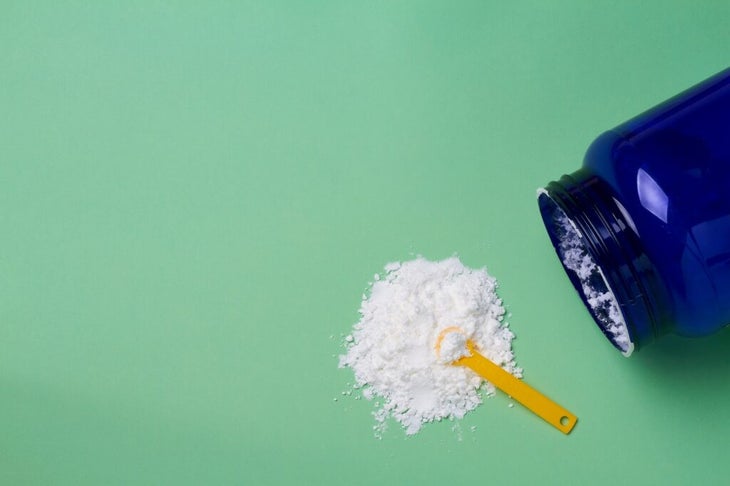News
Should Runners Supplement With Creatine?
Published
2 years agoon
By
Robert King
“], “filter”: { “nextExceptions”: “img, blockquote, div”, “nextContainsExceptions”: “img, blockquote”} }”>
There are countless supplements on the market today that claim to offer runners an extra edge. From pre-workout powders, to beetroot performance powder, to recovery shakes, the industry is vast and – this is important – largely unregulated.
One of those supplements that’s received significant attention over the years is creatine, ubiquitous in the weight-lifting world and now gaining interest as a supplement for distance runners.
Remind Me: What Exactly Is Creatine?
Creatine is produced naturally in the body and stored in skeletal muscle and the brain. It can be boosted through consumption of various foods, namely meat and fish. Creatine is released in response to high-intensity, explosive movements via the “phosphagen pathway.”
This pathway is the most rapid and short-lived of energy systems in our body – the others being the anaerobic and aerobic pathways. High-intensity sports like running deplete our natural reserves day-to-day, which is where supplementation can help. More creatine in the muscles means more potential energy availability, via this phosphagen pathway.
But how does this impact endurance runners? Despite its origins in the running world, with Linford Christie and Sally Gunnell using creatine in the early 1990s, historically, endurance athletes have avoided it because of weight gain resulting from water retention. So what exactly are the purported benefits, if any, and do those benefits outweigh the downsides?
RELATED: Five Major Signs That Your Nutrition Plan Isn’t Working for You
What the Studies Tell Us
A 2018 study looking at endurance cyclists showed that despite the increase in weight of athletes who supplemented with creatine, there were indeed improvements in the cyclists’ ability to perform in a 4K closing sprint of an endurance time trial, compared to those who hadn’t supplemented. This benefit indicates one of creatine’s other known effects: when taken in combination with carbohydrates (e.g. in the days before a race), it may help muscles in storing carbohydrates in the form of glycogen. Essentially, creatine can improve carb-loading. This is likely translatable to running, too.
According to the author of the study: “The changes in power output we observed during sprints are likely to have a major practical impact on the final outcome of a race, as both cycling and running events are often won by the athlete who can either stay with the leading pack during breakaways, or sprint to the finish line in the latter stages of a race.” All of this may be promising for long-distance runners who need a kick at the end of a race. Even in the world of ultramarathons, a sprint finish is never a bad thing to have up your sleeve.
Aside from training itself, evidence suggests that creatine supplementation may reduce muscle damage and enhance recovery after exercise. A 2004 study looking at marathon runners reported that markers of muscle soreness and inflammation were reduced after a 30KM run in participants who supplemented with creatine than those who didn’t. Several other studies corroborate these findings across multiple sports.
Some even go a step further, suggesting that creatine may reduce muscle atrophy during injury and promote recovery during rehabilitation, although not all studies agree on the extent supplementation helps at this stage. Since the speed at which we recover is key to how much training intensity our bodies can withstand, faster recovery means better training which, in turn, means faster times.
So far so good.

However, concerns have been raised through the years about long-term impacts of creatine supplementation. Evidence suggests that it could harm kidneys, cause muscle cramps, or cause stomach upset. Since it has been a well-used supplement since the early 1990s, it has been the subject of somewhere between 500 and 1,000 studies.
RELATED: The Trail Runner’s Guide To Vitamin D
Both short-term and long-term (up to 5 years) usage appears to be safe in healthy individuals. For those with pre-existing conditions such as kidney disease, as well as pregnant runners, it is always best to check with a doctor before starting supplementation. Everyone else, including elderly populations and adolescent athletes, consistently report benefits at recommended dosages without clinically significant side effects.
Creatine Occurs Naturally in the Body. Is Supplementing Even Necessary?
For many people, especially those who are sedentary, creatine supplementation won’t improve day-to-day functioning. However, for athletes who exercise regularly, creatine levels in the body are likely to drop, which is where supplementation may come in. While creatine has multiple proven benefits for omnivorous athletes, vegetarians and vegans have even more to gain from supplementing, as dietary creatine comes primarily from red meat and fish.
There are over 500 peer reviewed studies on creatine, of which around 70% conclude that creatine benefits high-intensity performance. While runners may not all consider their training intense enough to qualify, the impact of better interval training sessions, heavier lifts, faster recovery, and greater lean muscle mass is fairly clear. Studies disagree on the extent of the advantage creatine could imbue, but whether it’s 1 percent or 10 percent, these are the figures we often deal with in our sport. If Kipchoge ran 1 percent faster than his latest world record in Berlin, he would cruise past his Ineos time and be “officially” sub-2 hours. Creatine is no magic bullet, to be sure, but it could be the edge needed to hit your next PB.
Flora Beverley is an ultrarunner and sustainability advocate based in London, UK, with a background in science communication. Her social media channels (Instagram and YouTube) are dedicated to encouraging people of all abilities – especially women – to take up trail running and ultras. She is cofounder of Leo’s Box.
Recent News


4 Amazing Trips for Your Family
Choosing somewhere for a family vacation that would pique the attention of adults and kids alike can be a fun...


Customising Your Makeup with Blendable Blush Options
In cosmetics, one’s face is a canvas for self-expression and creativity. Among the myriad of products available, blush is a...


The Benefits of Regular Home Maintenance
Regular home maintenance is essential for maintaining and even raising the value of your house. A proactive approach to repairs...


Understanding the Importance of SEO in Adelaide
In the digital marketplace, Adelaide businesses are in a continuous contest to gain the attention of their target audiences. With...


Breaking Down the Numbers: Understanding the Average Traveling Nurses Pay
The open road, adventure, and the chance to heal – travel nursing promises an undeniable allure. But amidst the excitement,...


Dealing with Oily Skin in Summer: Tips and Tricks
As the temperature rises, those with oily skin often face an additional challenge—maintaining a clear and balanced complexion. Excess oil...


Mountain Wedding Ideas for 2024
A mountain wedding is a stunning choice for couples who cherish nature and desire a distinctive wedding experience. Whether you...


3 Of The Best Ways To Keep Your Salon Clean
It is of the utmost importance to ensure that a salon is kept scrupulously clean, not just for the sake...


3 Reasons You Should Get Blood Tests Every Year
Regular blood tests are essential for preserving general health and identifying potential problems early on. Medical professionals can evaluate your...


How to Make Your Next Crafts Project Pop
Crafting is a creative outlet that allows individuals to express themselves through various mediums such as paper crafts, sewing, painting,...
